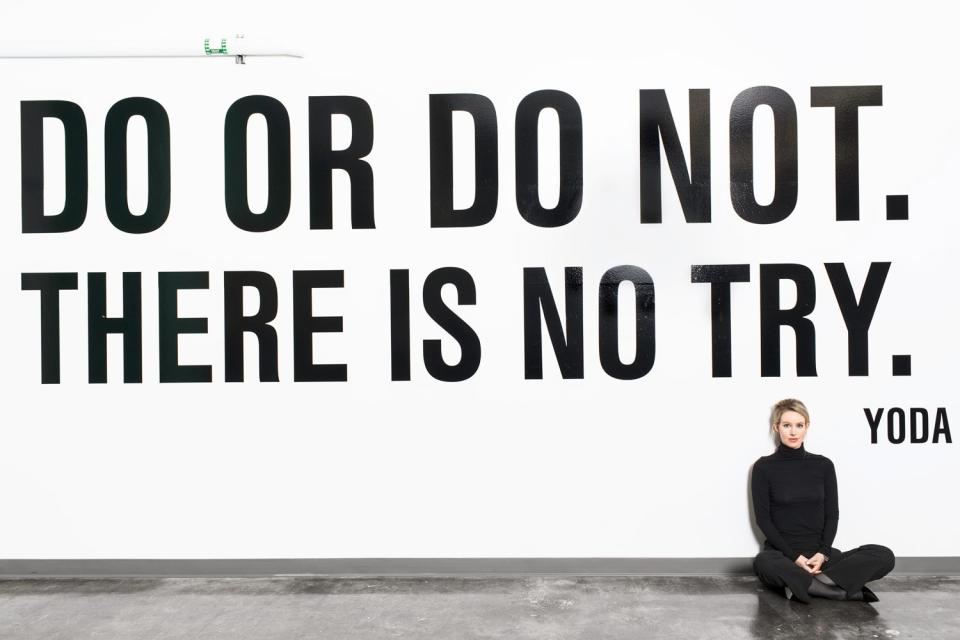The Inventor Out for Blood in Silicon Valley: The Holmes who went undetected... how one woman conned America’s kings of tech
It is easy to see how so many people were taken in by Elizabeth Holmes.
The subject of this documentary had a mission that you want to believe in - as an ambitious 19-year-old she started a company to make blood-testing easier, with the potential to save millions of lives.
She dropped out of Stanford in 2004 and blazed a trail through male-dominated Silicon Valley, gaining the respect of Bill Clinton and investment from the likes of Rupert Murdoch and Larry Ellison.
In 2015, Forbes named her the youngest and wealthiest self-made female billionaire in America after a $9 billion valuation of her firm Theranos (a portmanteau of “therapy” and “diagnosis”). The world was intrigued by this young woman with her direct, unblinking gaze, baritone voice and uniform of black roll-necks, Steve Jobs-style.

But this American-dream trajectory was too good to be true. Holmes’s idea, that hundreds of lab tests could be run from a single drop of blood on the machine she invented, was impossible. She was a fraud who deceived thousands, right up to the world’s most influential and rich players.
Today, she has the notoriety she craved but not for the reasons she wanted. A book about Theranos, Bad Blood, by journalist John Carreyrou, came out last year. ABC has a podcast about her, The Drop Out, and a film starring Jennifer Lawrence is on the way. There is an appetite for unpicking how the mighty have fallen - just look at the success of the documentary about the catastrophic Fyre festival.
This take stands out from the rest of the Holmes canon, in that it wants to understand her. Leaked footage of Holmes and interviews she gave is interwoven with talking heads trying their best to figure out if she is a straight fraud or so driven by her mission that she deceived herself and ignored the glaringly obvious fact her machine didn’t work. It’s by Alex Gibney, the Emmy and Academy Award winning director who made Enron: The Smartest Guys in the Room (coincidentally, Holmes’s father was a vice-president at Enron).

There is a clear gender split in who was taken in. Dr Phyllis Gardner, who taught her at Stanford, was able to see straight through Holmes, while countless men who should have been clever enough to know better did not. The scale of Theranos was impressive, employing 800 people including Ramesh “Sunny” Balwani, who became romantically involved with Holmes.
Much is made of her fixation on Thomas Edison - she named her blood-testing machine after him and puts all her faith in his quote: “Our greatest weakness lies in giving up. The most certain way to succeed is always to try just one more time.”
In an attempt to widen the relevance, Gibney explores the notion of not being afraid to fail. It’s at the centre of Silicon Valley’s ideology. This is fine when you’re developing a cute photo filter but failing must be taken more seriously if your prototype is a blood-testing kit or a driverless car and lives are at stake.
This documentary has all the makings of an engaging thriller: maverick protagonist on a seemingly noble mission, influential figures and human fallout. But it lacks pace. Towards the middle I wished it had been told in instalments, like the excellent podcast: two hours of Holmes is overload. It’s only when the credits roll, with a witty choice of song referring to a time Holmes showed humanity — MC Hammer’s U Can’t Touch This — that you realise what has been lacking. The story is serious, but it could have been told with a lighter touch.

 Yahoo News
Yahoo News 
